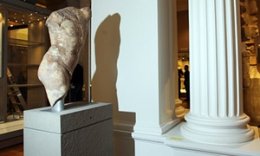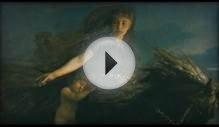
 This week's poem is a new English translation of Rainer Maria Rilke's sonnet "Archäischer Torso Apollos". "Apollo's Archaic Torso" is by a young Yorkshire writer, Sarah Stutt, who recently completed an MA in Creative Writing at the University of Hull. Sarah, a fluent speaker of German, has produced two translations, one fairly close to the original, the other looser. I've included both.
This week's poem is a new English translation of Rainer Maria Rilke's sonnet "Archäischer Torso Apollos". "Apollo's Archaic Torso" is by a young Yorkshire writer, Sarah Stutt, who recently completed an MA in Creative Writing at the University of Hull. Sarah, a fluent speaker of German, has produced two translations, one fairly close to the original, the other looser. I've included both.
While the more literal version is stately and slow-paced, I like the colloquial touch of "incredible" for the torso's head, and the brevity of the description of Apollo's eyes, "ripened like apples". Neither the literal "eye-apples" nor the generic "fruit" that other translators have used is so immediate. The comparison of the gaze to a candelabrum, or chandelier, whose flame has been lowered, is detailed in the original. Here, the treatment is straightforward and exact. Conversely, the description of the "curve" of the torso's chest as a "bow" adds complication, suggesting the metaphor of a weapon. This literalises the idea that the "curve" has the power to blind the viewer.
The movements in the next three lines are swift and graceful. Now the writer introduces the word "curve" which most other translators have already used in describing the torso's chest. The image of Apollo's smile being "steered by the gentle curve of his loins" and gliding to "the centre of procreation" is subtle and humorous.
The past subjunctive "If this were not so" is perhaps more formal-sounding than the German original, but it seems preferable to the un-idiomatic "else" that some translators choose. Stephen Mitchell's "otherwise" is a slightly more colloquial solution.
MORE TRANSLATION VIDEO












